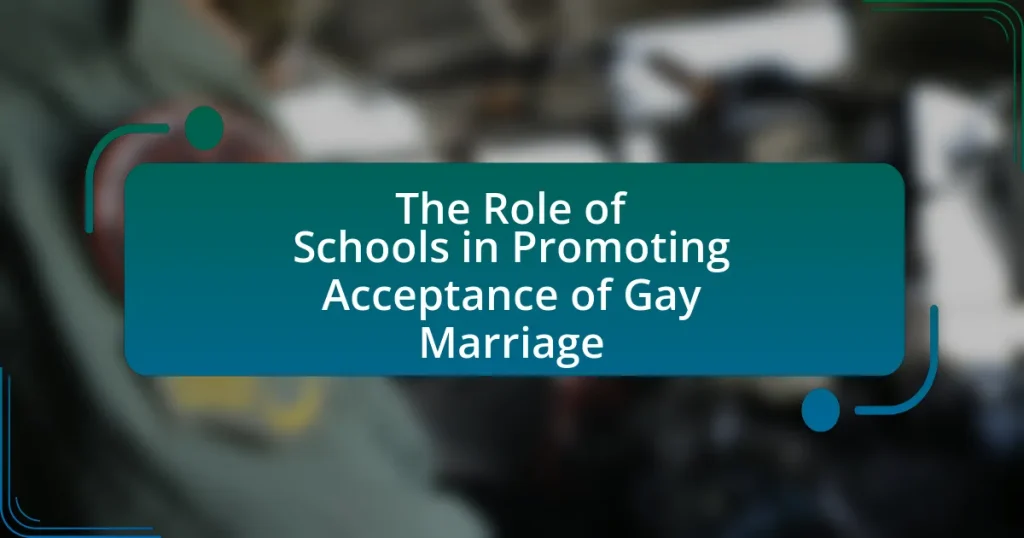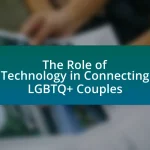The article examines the critical role of schools in promoting acceptance of gay marriage through education and inclusive policies. It highlights how comprehensive curricula addressing LGBTQ+ history and rights can challenge stereotypes, reduce prejudice, and foster positive attitudes among students. The article discusses various educational programs, school policies, and community engagement strategies that contribute to a supportive environment for LGBTQ+ individuals. Additionally, it addresses the challenges schools face, including societal stigma and resistance from parents, while emphasizing the importance of acceptance for the well-being of LGBTQ+ students and its potential to influence broader societal change.
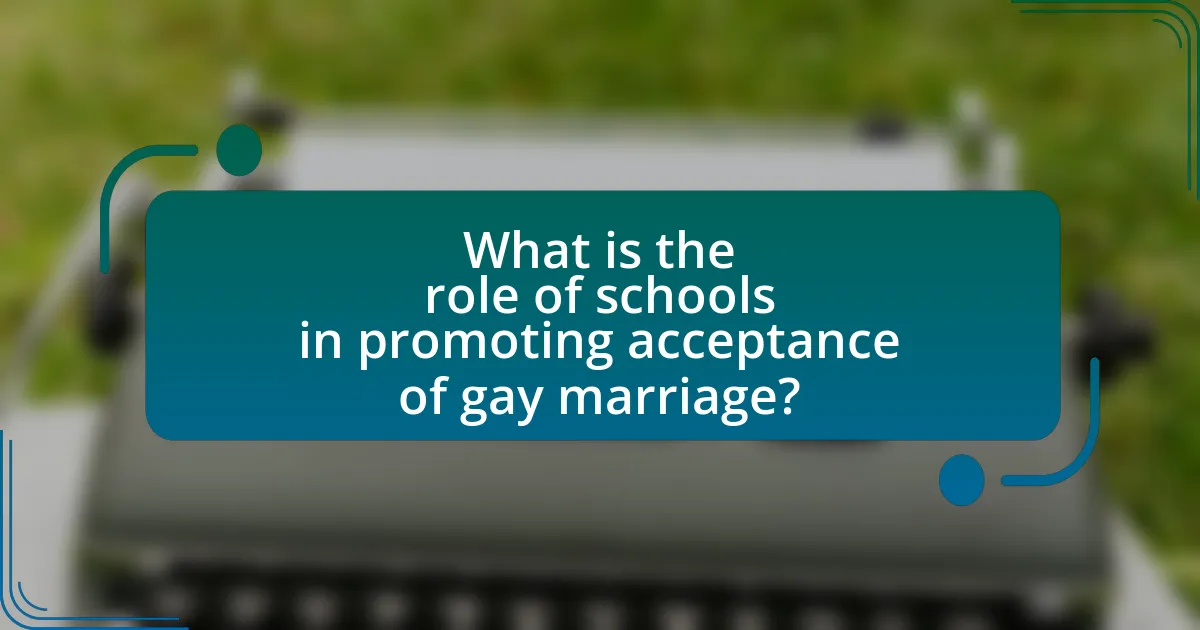
What is the role of schools in promoting acceptance of gay marriage?
Schools play a crucial role in promoting acceptance of gay marriage by providing education that fosters understanding and respect for diverse sexual orientations. Through inclusive curricula that address LGBTQ+ history, rights, and issues, schools can challenge stereotypes and reduce prejudice. Research indicates that when schools implement comprehensive sex education that includes discussions about sexual orientation, students exhibit more positive attitudes toward LGBTQ+ individuals. For example, a study published in the Journal of Homosexuality found that students exposed to inclusive education were more likely to support same-sex marriage and advocate for LGBTQ+ rights. Thus, schools serve as vital environments for cultivating acceptance and equality regarding gay marriage.
How do schools influence societal attitudes towards gay marriage?
Schools influence societal attitudes towards gay marriage by providing education that promotes understanding and acceptance of LGBTQ+ issues. Through inclusive curricula, discussions, and programs that address diversity and equality, schools can shape students’ perceptions and foster a more accepting environment. Research indicates that students exposed to comprehensive sex education, which includes information about sexual orientation and gender identity, are more likely to support gay marriage. For example, a study published in the Journal of Youth and Adolescence found that inclusive education correlates with increased acceptance of LGBTQ+ individuals among peers. Thus, schools play a critical role in shaping positive societal attitudes towards gay marriage through education and awareness initiatives.
What educational programs are implemented to foster acceptance?
Educational programs implemented to foster acceptance of gay marriage include comprehensive sex education curricula, anti-bullying initiatives, and diversity training workshops. These programs aim to educate students about LGBTQ+ issues, promote understanding, and reduce stigma. For instance, the “Safe Schools Coalition” provides resources and training for educators to create inclusive environments, while programs like “GLSEN’s Day of Silence” raise awareness about the impact of bullying on LGBTQ+ youth. Research indicates that schools with such programs report higher levels of acceptance and lower instances of discrimination among students.
How do school policies reflect attitudes towards gay marriage?
School policies reflect attitudes towards gay marriage by either promoting inclusivity or reinforcing traditional values. For instance, schools that implement anti-bullying policies inclusive of sexual orientation demonstrate a commitment to acceptance and equality, aligning with broader societal support for gay marriage. Conversely, schools that enforce policies prohibiting discussions about LGBTQ+ topics often indicate a resistance to recognizing gay marriage, reflecting prevailing conservative attitudes. Research shows that states with more progressive educational policies tend to have higher public support for gay marriage, illustrating a direct correlation between school policy and societal attitudes.
Why is it important for schools to promote acceptance of gay marriage?
It is important for schools to promote acceptance of gay marriage because it fosters an inclusive environment that supports the well-being of all students. Research indicates that acceptance of diverse family structures, including same-sex marriage, reduces bullying and discrimination, leading to improved mental health outcomes for LGBTQ+ youth. For instance, a study published in the Journal of School Health found that schools with inclusive policies reported lower rates of harassment and higher levels of student engagement. By promoting acceptance, schools not only educate students about equality and respect but also prepare them for a diverse society, ultimately contributing to a more equitable future.
What impact does acceptance have on LGBTQ+ students?
Acceptance significantly enhances the mental health and academic performance of LGBTQ+ students. Research indicates that LGBTQ+ students who experience acceptance from peers, family, and educational institutions report lower levels of depression and anxiety. For instance, a study published in the Journal of Youth and Adolescence found that supportive environments lead to higher self-esteem and better academic outcomes, with LGBTQ+ students in accepting schools achieving higher grades and lower dropout rates. This correlation underscores the importance of fostering acceptance within educational settings to promote the well-being and success of LGBTQ+ students.
How does acceptance in schools contribute to broader societal change?
Acceptance in schools fosters broader societal change by cultivating inclusive attitudes among students, which can lead to greater acceptance of diverse identities, including sexual orientation. Research indicates that when schools implement anti-bullying policies and promote diversity education, students develop more positive attitudes toward LGBTQ+ individuals. For instance, a study published in the Journal of Youth and Adolescence found that students exposed to inclusive curricula were significantly more likely to support gay marriage and advocate for LGBTQ+ rights. This shift in perspective among young people can influence societal norms, leading to increased acceptance and legal recognition of same-sex marriage, as seen in various countries where educational reforms preceded legislative changes.
What challenges do schools face in promoting acceptance of gay marriage?
Schools face significant challenges in promoting acceptance of gay marriage, primarily due to societal stigma and varying cultural beliefs. These challenges manifest in resistance from parents and community members who may hold traditional views opposing same-sex marriage, leading to potential backlash against educational initiatives. Additionally, educators may encounter a lack of training or resources to effectively address LGBTQ+ topics in the curriculum, which can hinder their ability to foster an inclusive environment. Research indicates that schools in regions with conservative attitudes towards LGBTQ+ issues often struggle to implement comprehensive anti-bullying policies and inclusive education programs, further complicating efforts to promote acceptance.
What resistance do educators encounter from parents and communities?
Educators encounter resistance from parents and communities primarily regarding the inclusion of LGBTQ+ topics in the curriculum, particularly related to gay marriage. This resistance often manifests as objections to teaching about sexual orientation and gender identity, with some parents expressing concerns that such discussions may conflict with their personal, cultural, or religious beliefs. For instance, a 2019 survey by the Pew Research Center found that 39% of parents opposed teaching about LGBTQ+ issues in schools, highlighting significant apprehension within certain communities. Additionally, educators may face backlash when implementing policies that promote inclusivity, as some community members may perceive these efforts as undermining traditional values.
How do legal and political factors affect school policies on gay marriage?
Legal and political factors significantly influence school policies on gay marriage by shaping the legal framework within which schools operate and determining the political climate surrounding LGBTQ+ issues. For instance, states that have legalized same-sex marriage often see schools adopting more inclusive policies that support LGBTQ+ students and families, reflecting the broader societal acceptance of gay marriage. Conversely, in regions where political opposition to gay marriage is strong, schools may implement policies that limit discussions on LGBTQ+ topics or fail to provide adequate support for LGBTQ+ students. This dynamic is evident in the varying policies across states; for example, states like California have comprehensive anti-discrimination laws that promote inclusivity in schools, while others may have laws that restrict discussions about sexual orientation. Thus, the interplay of legal recognition and political attitudes directly impacts how schools approach the subject of gay marriage and the support they offer to students.
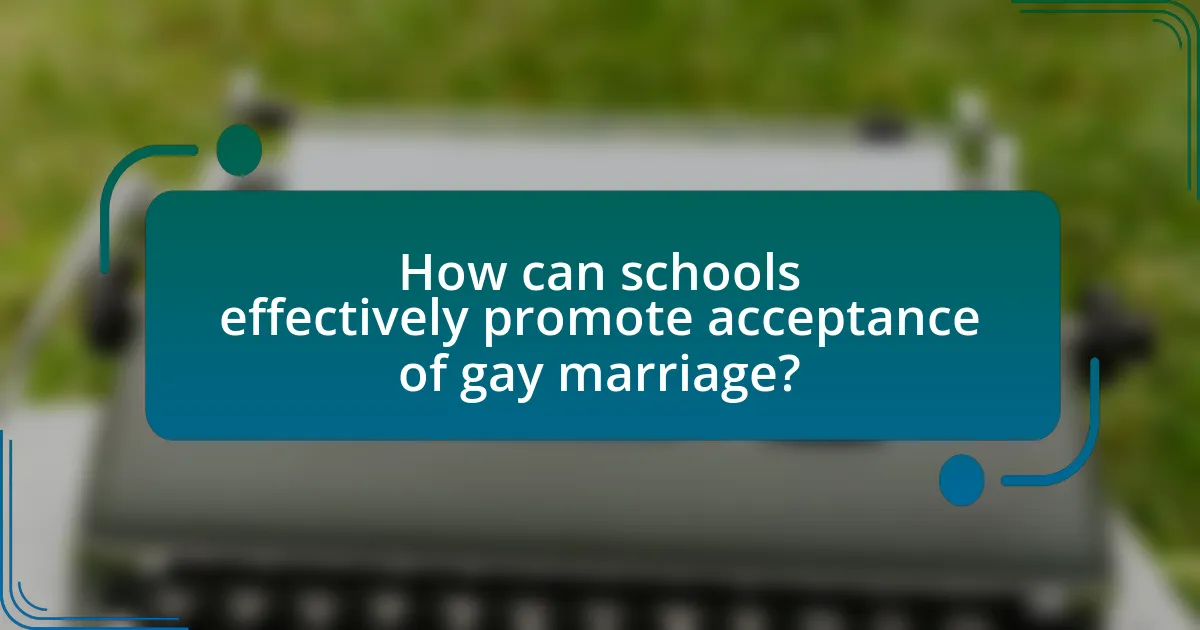
How can schools effectively promote acceptance of gay marriage?
Schools can effectively promote acceptance of gay marriage by implementing comprehensive educational programs that include LGBTQ+ history, rights, and the importance of equality. Research indicates that inclusive curricula can reduce prejudice and foster understanding among students; for example, a study published in the Journal of Homosexuality found that students exposed to LGBTQ+ topics showed increased acceptance and reduced homophobic attitudes. Additionally, schools can create supportive environments by establishing policies that protect LGBTQ+ students, training staff on inclusivity, and facilitating open discussions about diversity and respect. These actions contribute to a culture of acceptance and understanding regarding gay marriage.
What strategies can educators use to foster a supportive environment?
Educators can foster a supportive environment by implementing inclusive curricula that reflect diverse perspectives, including those related to LGBTQ+ issues. Research indicates that when schools incorporate lessons on acceptance and respect for all identities, students report feeling safer and more supported. For instance, a study by GLSEN found that LGBTQ+ inclusive curricula significantly reduce bullying and harassment, leading to improved mental health outcomes for students. Additionally, educators can create safe spaces, such as LGBTQ+ clubs, where students can express themselves freely and connect with peers. This approach not only promotes acceptance but also enhances the overall school climate, making it more conducive to learning and personal growth.
How can inclusive curricula be developed and implemented?
Inclusive curricula can be developed and implemented by integrating diverse perspectives and experiences into educational content. This involves conducting thorough research to identify the needs of various student demographics, including LGBTQ+ communities, and incorporating their histories, contributions, and challenges into lesson plans. For example, studies show that schools that include LGBTQ+ topics in their curricula can foster a more accepting environment, as evidenced by a 2019 report from GLSEN, which found that students in inclusive schools reported feeling safer and more supported. Additionally, professional development for educators on inclusive teaching practices is essential to ensure they are equipped to deliver this content effectively.
What role do extracurricular activities play in promoting acceptance?
Extracurricular activities play a significant role in promoting acceptance by fostering social interactions and building relationships among diverse student groups. These activities create inclusive environments where students can engage with peers from different backgrounds, enhancing understanding and empathy. Research indicates that participation in clubs and teams can reduce prejudice and increase acceptance of marginalized groups, including LGBTQ+ individuals. For instance, a study published in the Journal of Youth and Adolescence found that students involved in extracurricular activities reported higher levels of acceptance towards LGBTQ+ peers, demonstrating the positive impact of these programs on social attitudes.
How can schools engage with the community to support acceptance?
Schools can engage with the community to support acceptance by fostering partnerships with local organizations that advocate for LGBTQ+ rights and inclusivity. These collaborations can include hosting workshops, community events, and educational programs that promote understanding and acceptance of diverse sexual orientations. For instance, research from the Gay, Lesbian & Straight Education Network (GLSEN) indicates that schools with active community partnerships report higher levels of student acceptance and lower instances of bullying related to sexual orientation. By integrating these initiatives into their curriculum and extracurricular activities, schools can create a supportive environment that encourages dialogue and acceptance among students and the broader community.
What partnerships can schools form with local LGBTQ+ organizations?
Schools can form partnerships with local LGBTQ+ organizations to create inclusive educational programs and support systems. These partnerships can include collaborative workshops that educate students about LGBTQ+ history and rights, mentorship programs connecting students with LGBTQ+ role models, and joint events that promote awareness and acceptance of diverse sexual orientations and gender identities. Research indicates that schools with such partnerships report a decrease in bullying and an increase in student well-being, demonstrating the effectiveness of these collaborations in fostering a supportive environment for all students.
How can schools involve parents in discussions about gay marriage acceptance?
Schools can involve parents in discussions about gay marriage acceptance by organizing workshops and informational sessions that educate families on LGBTQ+ issues. These events can provide a platform for open dialogue, allowing parents to express their views while also learning about the importance of acceptance and inclusivity. Research indicates that parental involvement in school discussions can lead to more supportive environments for LGBTQ+ students, as seen in studies conducted by the Human Rights Campaign, which highlight the positive impact of community engagement on acceptance levels.
What resources are available for schools to promote acceptance?
Schools can utilize various resources to promote acceptance, including educational programs, training workshops, and inclusive curricula. Organizations such as GLSEN (Gay, Lesbian & Straight Education Network) provide comprehensive resources, including lesson plans and training for educators to foster a supportive environment for LGBTQ+ students. Additionally, the Human Rights Campaign offers toolkits and guides for schools to implement policies that promote acceptance and inclusivity. Research indicates that schools with inclusive policies and programs see a reduction in bullying and an increase in student well-being, highlighting the effectiveness of these resources in creating a more accepting school culture.
What training programs exist for teachers on LGBTQ+ issues?
Training programs for teachers on LGBTQ+ issues include the Safe Schools Coalition, which provides resources and training to create inclusive environments, and GLSEN’s Educator Training, which focuses on best practices for supporting LGBTQ+ students. Additionally, the Human Rights Campaign offers professional development workshops aimed at fostering understanding and acceptance of LGBTQ+ topics in educational settings. These programs are designed to equip educators with the knowledge and skills necessary to address LGBTQ+ issues effectively, thereby promoting a more inclusive school culture.
How can schools access educational materials on gay marriage?
Schools can access educational materials on gay marriage through various resources such as educational websites, LGBTQ+ advocacy organizations, and government educational resources. For instance, organizations like GLSEN (Gay, Lesbian & Straight Education Network) provide lesson plans, guides, and resources specifically designed for educators to teach about LGBTQ+ issues, including gay marriage. Additionally, the Human Rights Campaign offers educational toolkits that schools can utilize to foster understanding and acceptance of gay marriage. These resources are backed by research indicating that inclusive education promotes a more accepting school environment, which is crucial for the well-being of LGBTQ+ students.
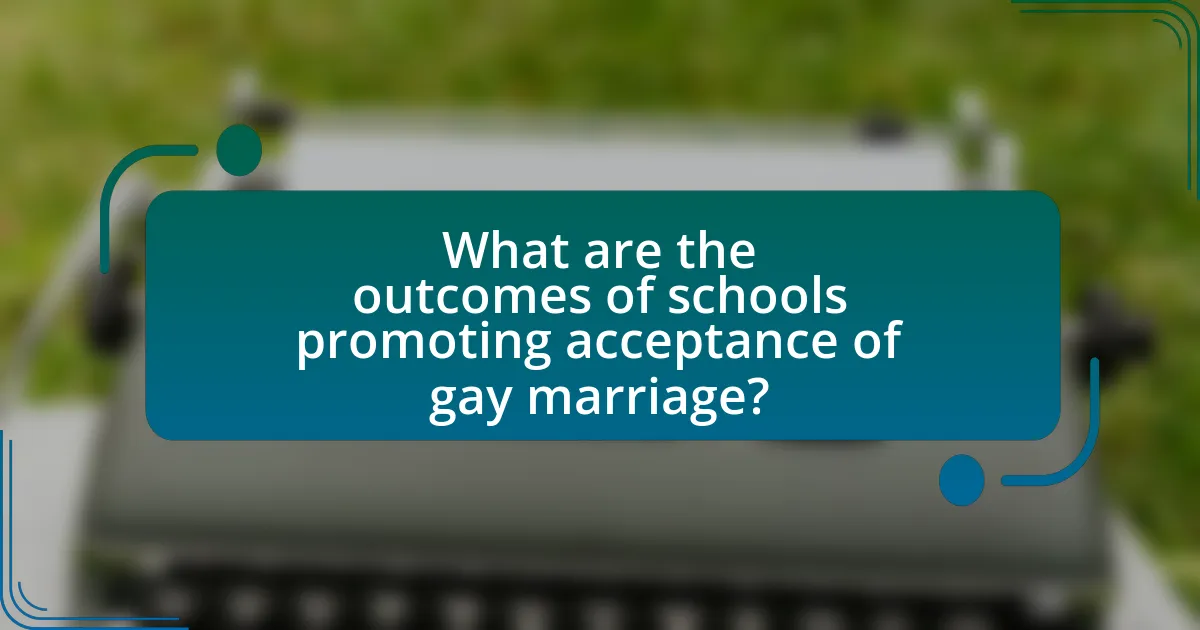
What are the outcomes of schools promoting acceptance of gay marriage?
Schools promoting acceptance of gay marriage lead to increased inclusivity and reduced bullying among students. Research indicates that environments fostering acceptance contribute to higher levels of mental well-being for LGBTQ+ students, as evidenced by a study published in the Journal of School Psychology, which found that supportive school climates significantly lower rates of depression and anxiety among these students. Furthermore, promoting acceptance cultivates a culture of respect and understanding, which benefits all students by enhancing social cohesion and reducing discrimination.
How does acceptance in schools affect student well-being?
Acceptance in schools significantly enhances student well-being by fostering a supportive environment that reduces feelings of isolation and anxiety. Research indicates that students who perceive acceptance from peers and educators experience higher levels of self-esteem and lower rates of depression. For instance, a study published in the Journal of School Psychology found that LGBTQ+ students in inclusive school environments reported better mental health outcomes compared to those in less accepting settings. This correlation underscores the importance of acceptance in promoting overall student well-being, as it directly influences emotional stability and social connectedness.
What evidence exists linking acceptance to improved mental health for LGBTQ+ students?
Evidence linking acceptance to improved mental health for LGBTQ+ students includes studies showing that supportive environments significantly reduce mental health issues such as depression and anxiety. For instance, research published in the Journal of Youth and Adolescence by Toomey et al. (2010) found that LGBTQ+ students who reported higher levels of acceptance from peers and family experienced lower rates of suicidal ideation and substance abuse. Additionally, a study by the Gay, Lesbian and Straight Education Network (GLSEN) in 2019 indicated that schools with inclusive policies and practices reported lower levels of harassment and victimization, correlating with improved mental health outcomes among LGBTQ+ students. These findings underscore the critical role of acceptance in fostering mental well-being within this demographic.
How does acceptance influence academic performance and engagement?
Acceptance significantly enhances academic performance and engagement among students. When students feel accepted, they are more likely to participate actively in class, collaborate with peers, and exhibit higher motivation levels. Research indicates that a supportive environment fosters a sense of belonging, which correlates with improved academic outcomes. For instance, a study published in the Journal of Educational Psychology found that students who perceive acceptance from their peers and teachers demonstrate higher grades and increased engagement in school activities. This connection underscores the importance of acceptance in creating an inclusive educational atmosphere that promotes both academic success and active participation.
What long-term societal changes can result from school-led acceptance initiatives?
School-led acceptance initiatives can lead to significant long-term societal changes, including increased social cohesion and reduced discrimination against LGBTQ+ individuals. By fostering an environment of acceptance and understanding, these initiatives can help normalize diverse sexual orientations and identities, leading to a more inclusive society. Research indicates that students exposed to acceptance initiatives are more likely to develop positive attitudes toward LGBTQ+ peers, which can translate into lower rates of bullying and harassment. A study published in the Journal of Youth and Adolescence found that schools implementing comprehensive anti-bullying policies and acceptance programs saw a 20% decrease in reported incidents of bullying related to sexual orientation over five years. This shift not only benefits LGBTQ+ students but also cultivates empathy and respect among all students, contributing to a more harmonious community.
How does school acceptance contribute to reducing discrimination in society?
School acceptance contributes to reducing discrimination in society by fostering an inclusive environment that promotes understanding and respect among diverse groups. When schools implement policies and curricula that support acceptance of all sexual orientations, including gay marriage, they educate students about diversity and the importance of equality. Research indicates that inclusive educational settings lead to lower levels of bullying and discrimination; for instance, a study by GLSEN found that LGBTQ-inclusive curricula significantly reduce victimization and improve the overall school climate. This educational approach not only benefits LGBTQ students but also cultivates empathy and acceptance among their peers, ultimately leading to a more equitable society.
What role do schools play in shaping future generations’ views on marriage equality?
Schools play a crucial role in shaping future generations’ views on marriage equality by providing education that fosters understanding and acceptance of diverse relationships. Through inclusive curricula that address LGBTQ+ history, rights, and issues, schools can challenge stereotypes and promote empathy among students. Research indicates that students exposed to discussions about marriage equality in educational settings are more likely to support it; for instance, a study published in the Journal of Youth and Adolescence found that inclusive education significantly correlates with positive attitudes toward LGBTQ+ individuals. By integrating these topics into lessons, schools not only inform students but also cultivate a culture of respect and equality, ultimately influencing societal norms regarding marriage equality.
What best practices can schools adopt to ensure ongoing support for acceptance?
Schools can adopt inclusive curricula that incorporate LGBTQ+ history and perspectives to ensure ongoing support for acceptance. This practice fosters understanding and respect among students by providing a comprehensive view of diverse identities and experiences. Research indicates that inclusive education reduces bullying and discrimination; for instance, a study published in the Journal of School Psychology found that schools implementing LGBTQ+ inclusive curricula saw a 30% decrease in bullying incidents. Additionally, training staff on LGBTQ+ issues and creating safe spaces for students to express their identities further reinforces a culture of acceptance. These strategies collectively contribute to a supportive environment that promotes acceptance of gay marriage and LGBTQ+ individuals.
How can schools measure the effectiveness of their acceptance initiatives?
Schools can measure the effectiveness of their acceptance initiatives through surveys and assessments that evaluate student attitudes towards LGBTQ+ individuals and issues. By conducting pre- and post-initiative surveys, schools can quantify changes in student perceptions and acceptance levels. For example, a study by GLSEN (Gay, Lesbian & Straight Education Network) found that schools implementing comprehensive anti-bullying policies and inclusive curricula saw a significant increase in student acceptance of LGBTQ+ peers, with reported acceptance levels rising by over 20% in some cases. Additionally, tracking incidents of bullying or discrimination before and after the initiatives can provide concrete evidence of their impact.
What steps can schools take to continuously improve their approach to acceptance?
Schools can continuously improve their approach to acceptance by implementing comprehensive diversity and inclusion training for staff and students. This training should focus on understanding LGBTQ+ issues, fostering empathy, and promoting respectful dialogue. Research indicates that schools with such programs see a significant reduction in bullying and an increase in overall student well-being, as evidenced by a study published in the Journal of School Health, which found that inclusive curricula positively impact students’ attitudes towards diversity. Additionally, schools should establish clear anti-discrimination policies and create safe spaces for LGBTQ+ students, ensuring that all students feel valued and supported. Regular assessments of school climate and student feedback can further guide improvements in acceptance initiatives.
